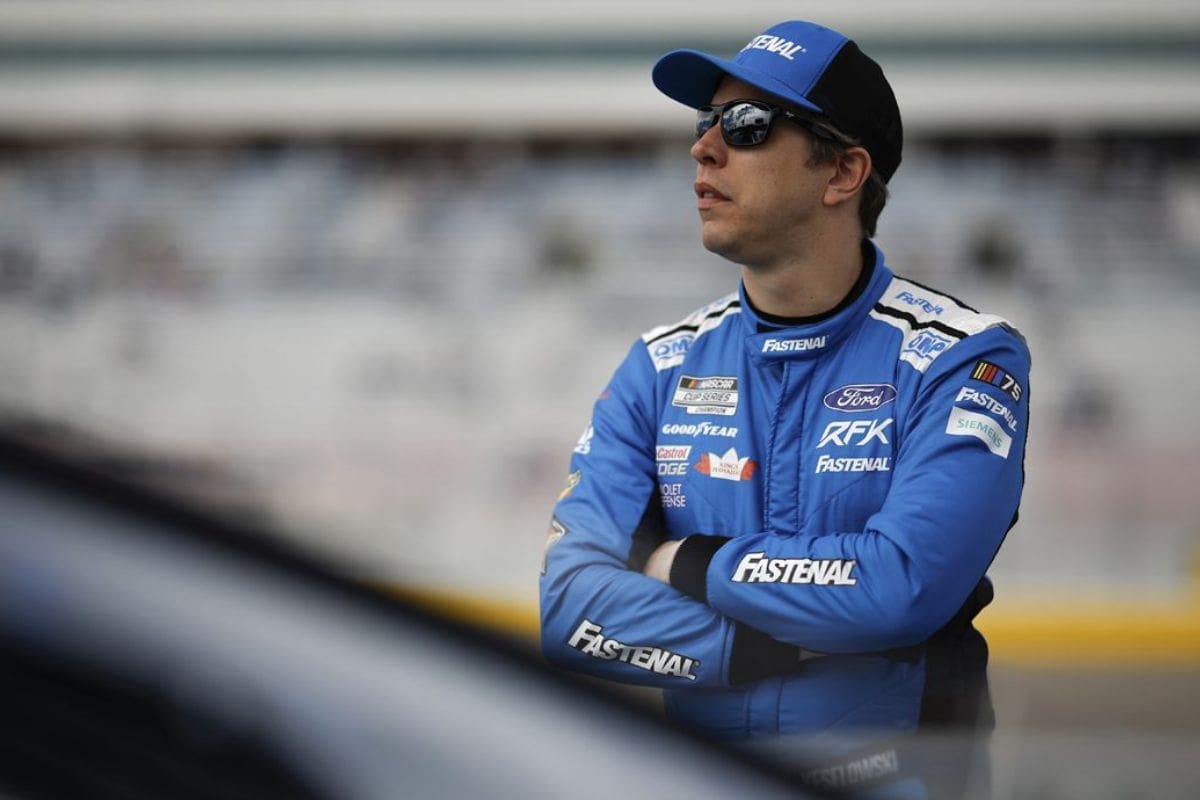Brad Keselowski Reacts to Gene Haas: Brad Keselowski’s response to Gene Haas’s decision to retain a charter for Stewart-Haas Racing (SHR) is positioned to be a pivotal moment in the strategic landscape of NASCAR. As both a driver and co-owner of RFK Racing, Keselowski is keenly aware of the ramifications this decision holds for team competitiveness and financial resilience. The ripple effects of Haas’s move on the charter market could necessitate a recalibration of Keselowski’s approach to securing a charter for RFK Racing, potentially reshaping their strategic initiatives and long-term objectives in the NASCAR Cup Series. How Keselowski navigates this development will be significant.
Key Takeaways
- Keselowski acknowledges Gene Haas’s decision reshapes NASCAR’s competitive landscape and increases charter market dynamics.
- He emphasizes the strategic importance of retaining a charter for brand promotion and competitive advantage.
- Keselowski points out the scarcity of charters heightens competition and drives up prices.
- He stresses the need for strategic financial planning amid rising charter valuations.
- Keselowski highlights the importance of aligning charter acquisition with RFK Racing’s long-term goals for sustained growth.
Gene Haas’s Decision and Its Impact on the Charter Market
Gene Haas’s decision to maintain one Cup Series charter for his Haas Factory team while transferring another to Front Row Motorsports is poised to significantly reshape the competitive landscape and economic dynamics of the NASCAR charter market. By retaining a charter, Haas secures continued visibility and brand promotion for Haas Automation and HaasTooling.com, a strategic move that underscores the importance of brand integration within top-tier motorsport events.
The transfer of a charter to Front Row Motorsports, rumored to be valued at approximately $25 million, highlights the escalating financial stakes within the NASCAR charter market. This transaction not only equips Front Row Motorsports with improved competitive capabilities but also establishes a new benchmark for the economic valuation of charters. The substantial price tag shows the growing prestige and attractiveness of owning a charter, reflecting broader trends of increasing investment in the sport.
This strategic maneuver by Haas has significant implications for other teams, such as RFK Racing and 23XI Racing, who are striving to secure charters. With one less charter available, these teams face heightened competition and potentially inflated costs to acquire remaining charters. The scarcity of charters, now reduced to two available slots, tightens the market and could drive up demand and prices, creating a more competitive bidding environment.

Brad Keselowski’s Perspective on NASCAR Charter Market Dynamics
Brad Keselowski, reflecting on Gene Haas’s recent charter decisions, underscored how the fundamental principles of supply and demand are reshaping the economic landscape of the NASCAR charter market. Keselowski, speaking ahead of the USA Today 301 at New Hampshire Motor Speedway, provided an analysis of the current charter market dynamics, emphasizing that a reduction in charter supply inherently increases demand, which in turn can drive up prices. This observation is not merely speculative; it is rooted in the basic economic theory that governs market behavior across different sectors.
“I mean the charter market is… like anything else- Supply and demand. So, a reduction in supply increases demand whether that be through, the money you have to pay for or whatever else that might be. So many changes to that dynamics,” -(brad)
Keselowski’s perspective is particularly insightful when considering the evolving nature of these dynamics. He highlighted several key points:
- Supply Reduction: The decrease in available charters creates a scarcity that heightens competition among teams, leading to increased valuation of the remaining charters.
- Financial Implications: The rising prices for charters necessitate a more strategic financial approach from teams, as they must evaluate the long-term return on investment versus immediate expenditures.
- Market Adaptation: Teams are compelled to adapt to these changes by either consolidating their resources or seeking inventive financial strategies to remain competitive.
"The charter market is like anything else, supply and demand."
.@keselowski discussed with media about managing wet weather tires at New Hampshire as well as Gene Haas keeping one charter and how it affects the charter market.
📹: @cfolsom_racing pic.twitter.com/HXEzgljucS
— Frontstretch (@Frontstretch) June 22, 2024
Keselowski’s analysis also touched upon the broader implications for the sport. Financial considerations and the shifting landscape mean that teams must be more judicious in their decisions, balancing economic pressures with competitive aspirations. The interplay of these factors exemplifies the complexity of the NASCAR charter market, where strategic foresight and adaptability are paramount.
Potential Acquisition and Driver Consideration
Given the evolving charter market dynamics, the potential acquisition of a new charter for RFK Racing presents a strategic opportunity that Keselowski is actively evaluating, with Connor Zilisch emerging as a prime candidate for this venture. Keselowski, as co-owner, understands the importance of making calculated investments to strengthen the team’s competitive edge in the NASCAR Cup Series. Acquiring a new charter represents not just an expansion but also a significant step towards long-term stability and success for RFK Racing.
In his assessment, Keselowski has identified Connor Zilisch as a promising young talent poised to make a substantial impact. Zilisch’s proficiency on the track has not gone unnoticed; his driving skills and racing skill suggest he has the potential to thrive in the high-stakes environment of the Cup Series. Keselowski’s confidence in Zilisch is indicative of a broader vision for RFK Racing, wherein nurturing young talent is as crucial as the acquisition of tangible assets like charters.
“I think right now, the best young talent [..] that I see at least, that could drive a Cup car, is probably Connor Zilisch. When I keep my eyes open, and I watch him race, he’s the one that I see has the most potential. […] If you told me, ‘Brad, go put a young driver in, make him a star, and here’s all the money to do it,’ he’s the guy.”-(brad)
From a strategic standpoint, integrating a youthful driver such as Zilisch aligns with RFK Racing’s forward-thinking ethos. The decision to contemplate Zilisch underscores a commitment to innovation and rejuvenation within the team. This potential move could invigorate the team’s dynamics by blending Zilisch’s fresh perspective with the established expertise within RFK Racing.
Keselowski’s judicious evaluation of both the charter acquisition and driver selection reflects a meticulous approach to team development. The synergy between securing a new charter and onboarding a rising star like Zilisch could kickstart a transformative phase for RFK Racing, reinforcing its competitive stature in NASCAR’s upper echelons.
Status of RFK Racing and Performance Overview
Building on the strategic considerations for future growth, RFK Racing’s current performance in the NASCAR Cup Series showcases a robust competitive presence, with Brad Keselowski and Chris Buescher consistently securing commendable standings and race finishes.
Keselowski, piloting the No. 6 Ford Mustang GT, has remarkably achieved a victory at Darlington, reinforcing his competitive edge. His performance metrics include seven top-5 finishes and nine top-10s, positioning him 9th in the driver standings. This consistent performance shows his adaptability and driving prowess within a highly competitive field.
Chris Buescher, driving the No. 17 car, has also demonstrated remarkable consistency and skill. His 13th place in the standings, bolstered by three top-5 finishes and seven top-10s, signifies a strong season performance. Buescher’s ability to secure high placements consistently is indicative of his steady growth and the strategic acumen of the RFK Racing team.
RFK Racing’s competitive strength can be distilled into three key performance indicators:
- Top-5 Finishes: Keselowski’s seven and Buescher’s three top-5 finishes collectively highlight the team’s ability to compete at the front of the pack.
- Top-10 Finishes: With Keselowski achieving nine and Buescher securing seven top-10 finishes, the team’s consistency in high placements is evident.
- Driver Standings: Keselowski’s 9th and Buescher’s 13th positions in the standings underscore the team’s competitive standing within the series.
Analyzing these metrics, it becomes clear that RFK Racing is not only maintaining competitive relevance but also laying a solid foundation for future advancements in the NASCAR Cup Series. The team’s strategic focus and performance consistency are key factors contributing to their ongoing success.

Future Plans and Charter Agreement
The future plans and charter agreement considerations for RFK Racing are pivotal in shaping the team’s strategic direction within the NASCAR Cup Series. As of now, neither Brad Keselowski nor Roush Fenway Keselowski Racing has publicly announced definitive plans to acquire a charter from Stewart-Haas Racing or any other team. This decision-making process involves a complex interplay of financial arrangements and contractual agreements, which are integral to the strategic operations of RFK Racing.
When analyzing the charter market dynamics, Keselowski must weigh several factors, including the potential long-term benefits against the immediate financial outlays and contractual obligations. Acquiring a charter can provide guaranteed entry into races, which is crucial for sponsorship negotiations and team stability. However, the financial burden and the need for strategic alignment with RFK Racing’s long-term goals necessitate a thorough analytical approach.
Here is a breakdown of key considerations:
| Factor | Implication for RFK Racing |
|---|---|
| Financial Outlay | Significant initial investment |
| Guaranteed Entry | Ensures race participation |
| Sponsorship Leverage | Elevates attractiveness to sponsors |
| Strategic Alignment | Must align with long-term goals |
Keselowski’s strategic vision will be paramount in maneuvering these charter dynamics. Ensuring that RFK Racing remains competitive while also securing financial stability and strategic growth is a delicate balancing act. The decision to acquire a charter, or not, will hinge on a detailed analysis of these factors, weighing the immediate costs against the potential for sustained competitive advantage.
Ultimately, the future plans and charter agreements will play a significant role in determining RFK Racing’s trajectory in NASCAR. This meticulous approach will be vital for guaranteeing that the team not only survives but thrives in the highly competitive NASCAR environment.
News In Brief: Brad Keselowski Reacts to Gene Haas
Gene Haas’s decision to retain a charter for Stewart-Haas Racing fundamentally shifts the dynamics of the NASCAR charter market. This move necessitates a strategic reassessment by Brad Keselowski and RFK Racing, potentially impacting long-term objectives and competitiveness within the NASCAR Cup Series.
Analyzing the implications of Haas’s action is vital for RFK Racing, as charter ownership remains essential to financial stability and team performance. Consequently, Keselowski’s approach to securing a charter will be pivotal in maneuvering through the evolving landscape.
ALSO READ : Manufacturer Standings Post-SciApps 200 Race: Season Overview

